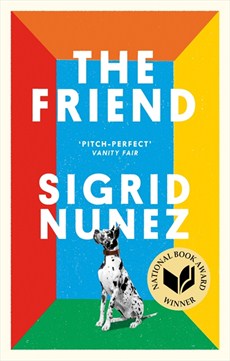You have no items in your cart. Want to get some nice things?
Go shopping When her best friend commits suicide, the unnamed narrator in Sigrid Nunez’s The Friend reluctantly takes in his beloved dog Apollo at the request of his third wife. The narrator is a ‘cat person’, living in a tiny rent-controlled apartment in Manhattan with a no-dogs policy. Apollo is a Great Dane weighing in at 180lbs. Although she quickly faces eviction, the narrator cannot simply get rid of the dog. His ‘strikingly human’ eyes remind her of her dead friend, and by saving ‘beautiful, ageing, melancholy Apollo’, she feels she is somehow saving him too.
When her best friend commits suicide, the unnamed narrator in Sigrid Nunez’s The Friend reluctantly takes in his beloved dog Apollo at the request of his third wife. The narrator is a ‘cat person’, living in a tiny rent-controlled apartment in Manhattan with a no-dogs policy. Apollo is a Great Dane weighing in at 180lbs. Although she quickly faces eviction, the narrator cannot simply get rid of the dog. His ‘strikingly human’ eyes remind her of her dead friend, and by saving ‘beautiful, ageing, melancholy Apollo’, she feels she is somehow saving him too.
But I don’t want to mislead you. Several readers – no doubt charmed by the zingy canine cover – have left comments on Amazon lamenting a lack of plot and too little dog. The Friend, Nunez’s seventh novel, won the 2018 National Book Award, and owes more to Rachel Cusk or Jenny Offill than Marley and Me. Intense, confessional and unashamedly literary, it’s as much a meditation on the art of writing as it is a book on love, loss and the magical bond between a woman and her dog.
Much of the story reads like memoir or love letter, with the narrator addressing her best friend, the writer, teacher, adulterer, ‘you’. Once a student in his class, the narrator succumbed to his charms – or rather blunt proposal ‘we should fuck’ – only for him to pronounce afterwards that it would be a mistake for them to try to be more than friends. That semester a fellow student became ‘Wife One’. We don’t know why he never managed to love the narrator as she loved him, but we do know he wasn’t worthy of her devotion.
Deep down, the narrator knows this too. She casts her friend as ‘Lurian’ – a self-absorbed, egotistical womaniser in the model of David Lurie from J. M. Coetzee’s Disgrace. Her portrait is devastating and acerbic. Reflecting on his student conquests later in life, she notes that the young women shared none of his desire; for them, the thrill was in ‘bringing an older man in a position of authority to his knees’.
The narrator is also a writer, and there is much on the trials of writing, the spite of the literary world and the inanity of teaching: from sexual correctness that stifles discussion, to pointless, banal meetings (how to stop students reading assigned books on their phones?). Through her cynicism, we can speculate about the causes of her friend’s depression – his failure to achieve his literary ambitions (that Nobel) and the pain of no longer being adored by his students, of being seen as a dinosaur, ageing and impotent.
Nunez’s prose is precise and beautifully spare. Apollo has a nose ‘once a ripe dripping black plum, now crusty and grey like a used coal.’ Wife Three displays a ‘cold radiance like that of a blade’ at her husband’s funeral – ‘hint that I was somehow to blame,’ her manner suggests, ‘and I will cut you.’ There are flashes of dark humour too. When the vet discovers Apollo has taken over the narrator’s bed, forcing her to sleep on the floor, he is firm: ‘the last thing you want is for him to start thinking you’re his bitch.’ If only someone had told her this about ‘you’ years before.
Irresistible and moving without a hint of sentimentality, The Friend serves as a testament to love in all its messy, unreasonable, stupid, inexplicable guises. In mourning as a wife would, the narrator realises her love for ‘you’ runs deeper than she’d allowed herself to admit during his lifetime. ‘You’ might be undeserving (this is revealed definitively in a late twist) but what matters ultimately is her, not him. By caring for Apollo, the narrator establishes a bond that helps her to heal. If what we miss and mourn makes us who we are, then out of grief, comes the capacity to love again.
The Friend is out now from Virago
About Jennifer Kerslake
Jennifer Kerslake is an editor and writer. Born in Devon, she now lives in London where she works for the Orion Publishing Group.




